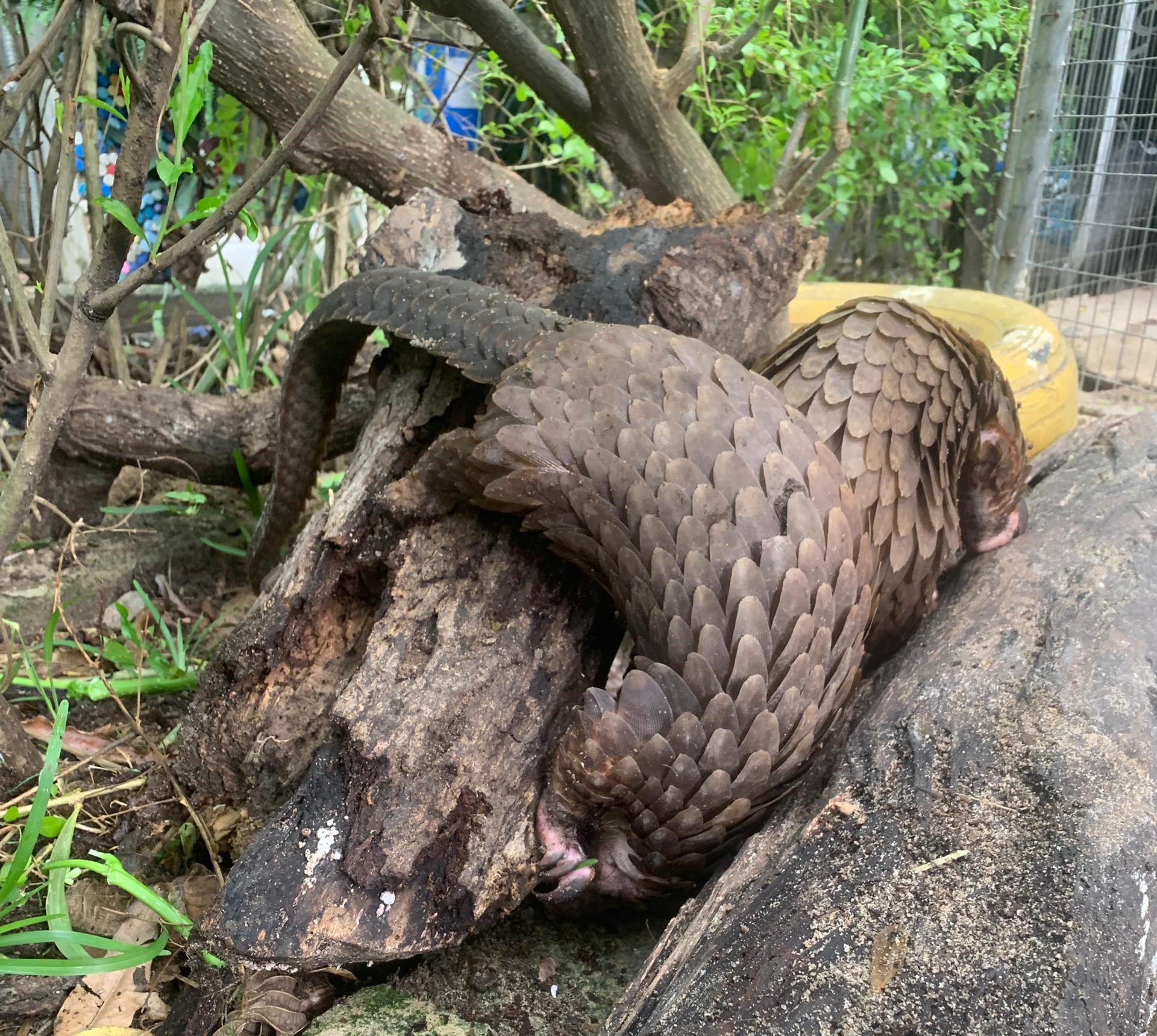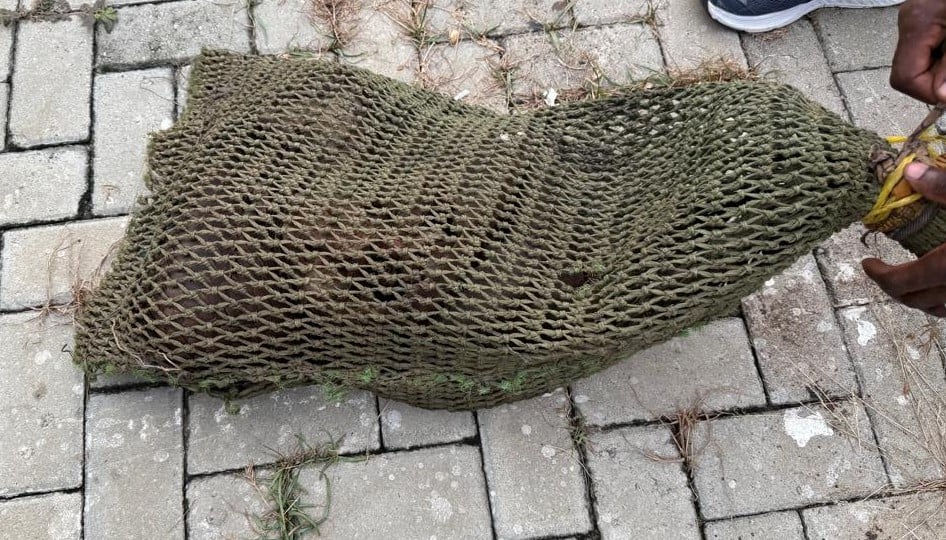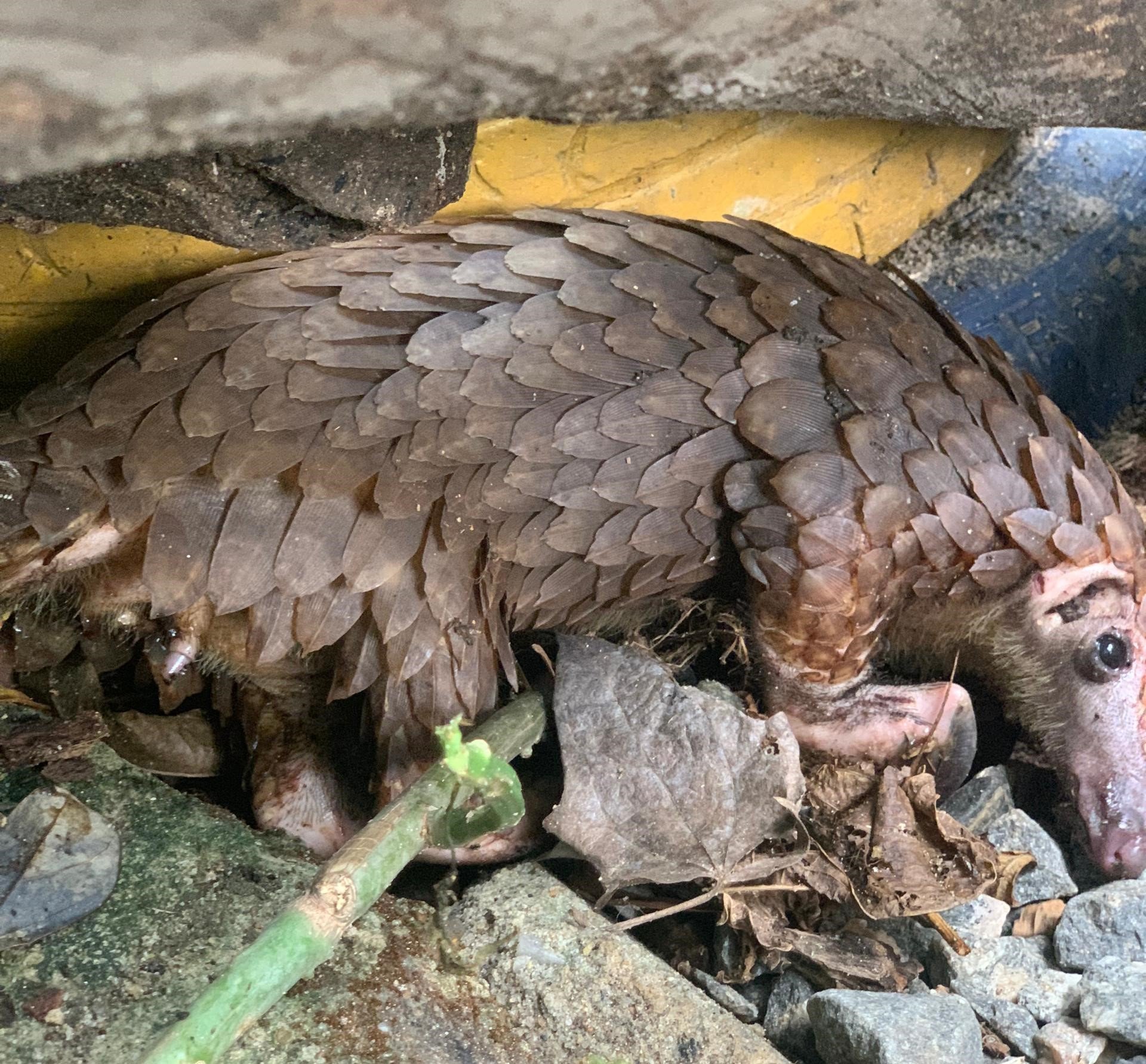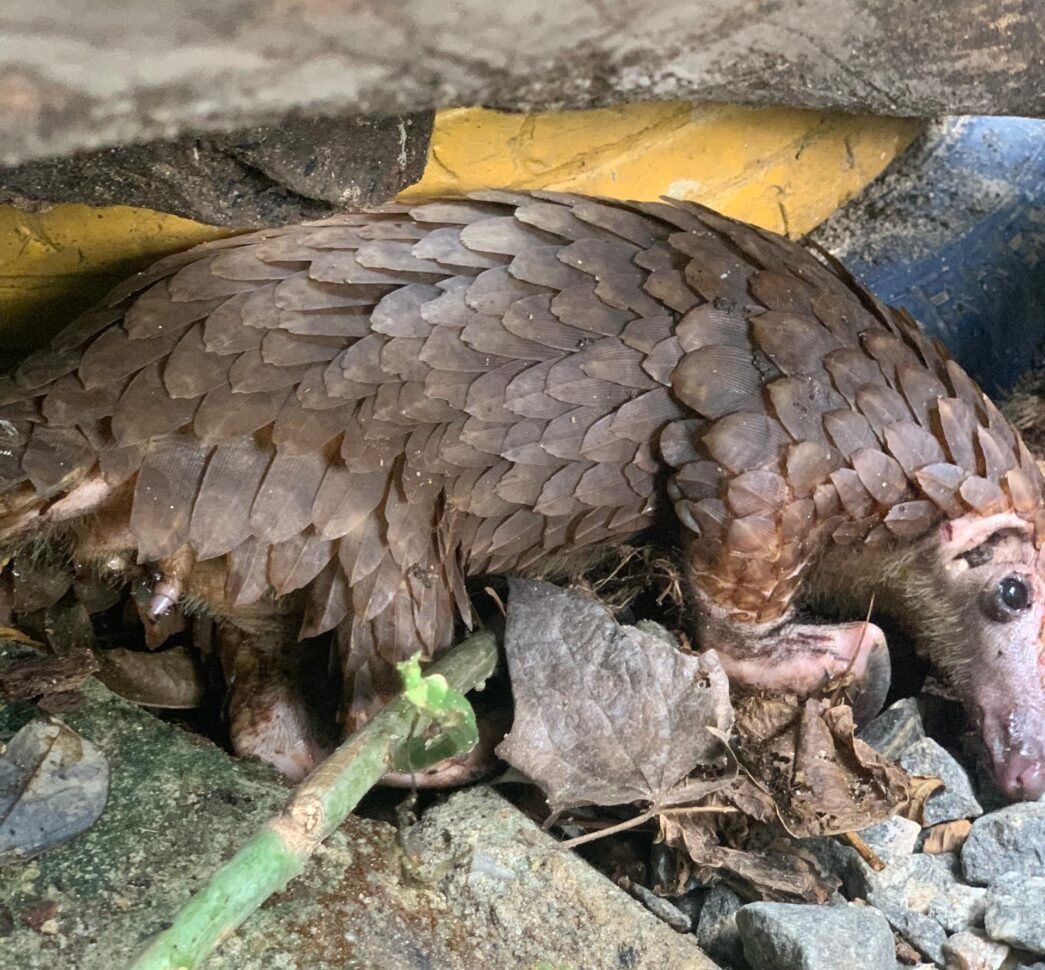The rescued pangolin is seen here at a rehabilitation shelter in Lagos, Nigeria. Photo by Focused Conservation
BY PATRICK EGWU
In June, a transnational wildlife trafficking syndicate operating between Cameroon and Nigeria was disrupted through a coordinated covert operation between the Nigerian Customs Service Special Wildlife Office and Focused Conservation, an international wildlife organisation that supports global enforcement efforts targeting illegal trafficking networks.
The trafficking syndicate is responsible for the trading of live pangolins – one of the most trafficked animals in the world. During the covert operation, two traffickers were arrested with three dead pangolins and two live ones. The surviving pangolins were transferred to Green Fingers Wildlife Conservation Initiative, a wildlife and environmental conservation organisation, where they are receiving emergency veterinary care.
“Despite the tragic loss of three pangolins, this operation demonstrates what can be accomplished through persistent undercover work, cross-border intelligence sharing, and well-coordinated enforcement,” said Rob Asbury, director of Wildlife Crime Units at Focused Conservation.
Advertisement
Nigeria remains an active hub for the illegal wildlife trade of pangolins in Africa. The country has been linked to the smuggling of more than 167 tonnes of pangolins since 2015. Between 2016 and 2019, more than 200 metric tons of pangolin scales were either seized or confiscated worldwide, according to a report by the Wildlife Justice Commission, an international organisation fighting against transnational organised wildlife crime.
Half of these seizures were linked to Nigeria. The report shows that the Nigeria-Singapore-Vietnam route has been identified as a significant transportation route for smuggling pangolin scales. Another study showed that shipments of pangolin products intercepted by authorities between 2010 and September 2021 in Nigeria amounted to 190,407 kilos of pangolin scales taken from at least 799,343 but potentially up to almost a million dead creatures.
“Nigeria has unfortunately emerged as one of the primary global hubs for pangolin trafficking, with over 51 metric tons of pangolin scales reportedly seized between 2016 and 2022—most of it destined for markets in Asia”, said Tim Santel, senior advisor, wildlife trafficking program at Focused Conservation.
Advertisement
“We’ve been working to disrupt this illicit trade by partnering with trusted local agencies and applying a proven, intelligence-led approach to wildlife crime enforcement.”
Santel said since 2018, Focused Conservation has supported operations leading to the seizure of nearly 3,700 kg of pangolin scales and dozens of live pangolins, including more than 500 kg of pangolin scales and several live pangolins in Nigeria alone.
“By connecting wildlife seizures in Nigeria to criminal networks and end-buyers in Asia, we’re helping Nigerian enforcement shift from reactive interdictions to proactive network dismantling, laying the groundwork for long-term disruption of the illegal wildlife trade,” he said.
A GROWING PROBLEM
Advertisement

Pangolin populations continue to decline globally due to growing recorded cases of poaching and trafficking. For instance, pangolin products remain the world’s most trafficked, mainly due to the high demand for their scales in local medicines in Asia, particularly in China, Hong Kong, Vietnam, and Taiwan.
Each year, up to 200,000 pangolins are poached from the wild worldwide, according to Wild Africa, an international conservation nonprofit specialising in public awareness campaigns to reduce demand for illegal wildlife products and inspire public support and political will to protect Africa’s wildlife and wild spaces.
But the black market in Nigeria is still booming, especially in the country’s south-west region, where pangolins are trafficked and displayed in open markets for sale.
Advertisement
Santel said corruption remains one of the biggest challenges to tackling wildlife crime in Nigeria and across Africa. He said Focused Conservation focuses on long-term engagement with thoroughly vetted and trusted local officers — empowering them with training, technical support, and on-the-ground mentorship.
“Our embedded advisors have helped expose and isolate corrupt actors in some investigations, including those within law enforcement and military circles, who are complicit in trafficking operations,” he said.
Advertisement
“Because we maintain a close presence with our partners, we’re able to identify red flags early and ensure that only credible officers are involved in sensitive investigations.”
He noted that the organisation works with authorities in Nigeria and local partners to see cases through from intelligence development to courtroom prosecution.
Advertisement
“We don’t just focus on making arrests, we work to build cases that hold up in court and result in meaningful consequences,” he said.
“Our collaborative efforts in Africa have led to the arrest and conviction of multiple corrupt individuals linked to transnational trafficking rings. These outcomes not only demonstrate what’s possible with the right structure and oversight, but also send a message to would-be traffickers: this is no longer a low-risk, high-reward enterprise.”
Advertisement
Olivia Swaak-Goldman, executive director at the Wildlife Justice Commission, says, “What we are seeing is a transformation in the enforcement landscape. Traffickers who once operated with impunity are now facing a new reality, one where Nigeria is no longer a safe haven for wildlife crime.”
“Wildlife trafficking is a complex, multi-billion-dollar organised crime industry, deeply linked to corruption and exploitation of governance weaknesses.”
Swaak-Goldman said her organisation provides an intelligence-led approach, which aims to strike at the heart of these networks to create lasting disruption.
The Wildlife Justice Commission’s role in Nigeria goes well beyond arrests, she said.
“We actively support the Prosecutor’s Office in building strong, evidence-based cases that hold traffickers accountable in court,” Swaak-Goldman added.
“Our contribution includes preparing detailed evidence briefs and ensuring that the intelligence we gather meets the highest legal standards, far exceeding the thresholds required for media or public reporting. This ensures the evidence can withstand intense judicial scrutiny and be relied upon to secure convictions.”
She said this approach has proven highly effective and has contributed to 12 successful convictions, including those of a Vietnamese kingpin and several key members of Lagos-based organised crime groups.
Linus Unah, West Africa director, Wild Africa, said a lot of progress has been made including more seizures, arrests, prosecutions and about a dozen convictions of wildlife traffickers recorded.
“It was a totally different scenario when we started, and there were a number of out-of-court settlements and rarely any convictions,” he said.
“The situation is different today.”
A NEW LAW TO THE RESCUE

As corruption worsens efforts to tackle wildlife trafficking, weak laws and regulatory frameworks have emboldened traffickers. However, in May this year, a new bill that seeks to enhance Nigeria’s response to serious and organised wildlife trafficking passed the third reading – a step closer to becoming a law.
The bill introduces stricter penalties for wildlife crime and provides investigators with greater authority to probe financial transactions and conduct intelligence-led operations. It also seeks to empower judges to expedite wildlife cases and recover assets while promoting international collaboration by aligning with global treaties.
“We look forward to speedy passage of the bill, given the crucial role it will play in tackling wildlife trafficking and habitat destruction,” Unah said. “Current laws do not serve as sufficient deterrence, and we’re hoping the bill, when it becomes law, will turn the tide.”
In 2024, Unah was part of a team that visited Kenya with senior Nigerian lawmakers. He said the reason for the trip was to show the lawmakers first-hand experience of Kenya’s ongoing efforts to tackle wildlife trafficking, including revamping their laws and enforcement mechanisms.
“The lawmakers saw the huge benefits of wildlife tourism to local communities and the overall economy,” he told TheCable. “They (lawmakers) visited several projects, had wide-ranging discussions with the people on the ground and met Kenyan wildlife officials and prosecutors.”
The overall goal, he said, was to learn from Kenya’s successful wildlife conservation and legal practices and draw from these lessons to align Nigeria’s legal framework with international best practices.
“By learning from Kenya’s successes and challenges, Nigerian officials are now in a better position to respond to wildlife trafficking back home,” he said.
TRANSNATIONAL COLLABORATION
To combat pangolin trafficking, experts like Santel and Unah say transnational collaboration and partnerships are instrumental to achieving this. Santel said wildlife crime is not just a local or national issue. It’s a transnational, organised crime enterprise.
“The syndicates that traffic pangolins, ivory, and great apes operate across borders, often with the same sophistication as drug cartels or human smugglers,” he said. “Transnational collaboration is no longer optional—it’s essential. When traffickers realise they’re being tracked across borders, that seizures are leading to arrests, and that prosecutions are sticking, the risk calculus changes. That’s how we create real deterrence.”
Santel said his organisation helps build transnational enforcement networks “grounded in trust, information sharing, and joint operational planning”.
This information sharing, he says, includes facilitating secure communication and collaboration between wildlife crime units in Nigeria, Uganda, Kenya, and other high-risk countries. Through this partnership, Santel said they provide trafficking intelligence, trend analysis, and investigative leads to a global network of transport, finance, and enforcement stakeholders.
To support anti-wildlife efforts in Nigeria, Focused Conservation partnered with the Nigeria Customs Service and, in 2022, signed an agreement with the special wildlife unit, which targets high-level traffickers and dismantles the transnational criminal syndicates behind the wildlife trade.
“What sets our model apart is the operational depth we bring through technical advisors — former US and UK law enforcement officers — embedded full-time with the task force,” Santel said.
“These advisors offer 24/7 support on everything from intelligence gathering to operational planning, surveillance, case development, and court preparation. This direct mentorship, combined with tactical training and provision of critical equipment, has dramatically enhanced Nigeria’s ability to pursue complex wildlife crime cases.”
Unah said the transnational nature of wildlife trafficking requires close collaboration between countries and enforcement agencies. He said this is key to taking on organised wildlife trafficking networks and making the greatest impact.
“Transnational collaboration means more cooperation between enforcement agencies, intelligence sharing and coordinated investigations or actions to stamp out illegal wildlife trade,” he said.
“Cross-border collaboration promotes intelligence-driven investigations and effective enforcement required to dismantle transnational criminal networks.”
Swaak-Goldman noted: “Wildlife trafficking is a transnational organised crime that exploits jurisdictional gaps and weak governance across borders. Intelligence sharing is essential to track these networks end-to-end, from source to destination, and to dismantle them at their core. This means that no single country can effectively tackle the issue alone.”
She added that international cooperation is crucial not only in dismantling the entire criminal infrastructure behind wildlife trafficking, but also to ensure that action taken in one country is reinforced by responses elsewhere in the network.











